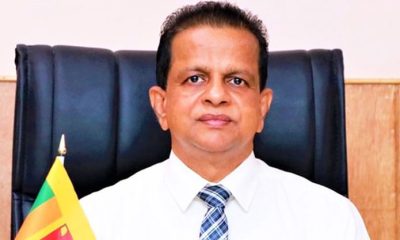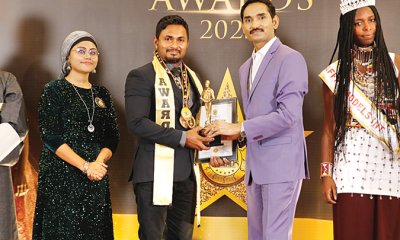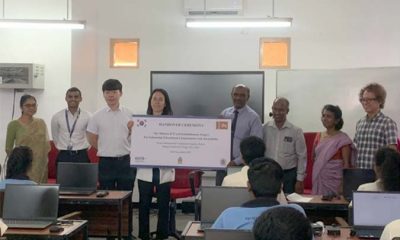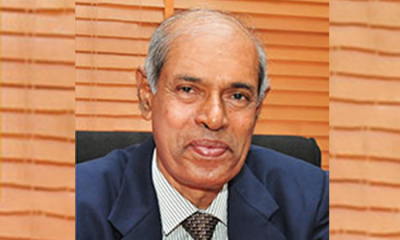News
About 90% of SL youth under 25 want to go overseas to live comfortably

By Rathindra Kuruwita
More than 90 percent of youth under 25 believe that they have to go overseas if they are to live comfortably, lecturer at the University of Vocational Technology, H.A Gayan Madushanka, who is one of the authors of a recent study titled ‘Better living, better opportunities: Exploring how economic distress influence the intention to migrate’ says.
The study had been carried out between June and August 2023, he said. 33 percent of respondents have completed an advanced-level coursework, nine percent have completed diploma-level coursework, 59 percent have completed degrees, and one percent have completed doctoral degrees, according to Madushanka.
“About 92 percent feel like this. 66 percent of people we interviewed were in the process of leaving the country. These are people who have at least started learning Korean, seeking employment in South Korea. We also found that 58 percent of the respondents were facing stress because of the economic crisis. There is a lot of uncertainty, and a lot of people don’t think they can achieve their objectives if they stay here,” he said.
Madushanka said they had interviewed a large number of university students and that most students had to stay in Colombo or move to the city to find jobs that match their education level. Many were not certain that it would not be possible with the starting salaries of most of the jobs available, he said.
“On the other hand, young people who have left the country seem to be enjoying a better quality of life. Most undergraduates feel that they, too, need to leave. A lot of undergraduates, who do not come from well off families, are struggling financially,” he said.
Almost all respondents believed that living in Sri Lanka would not provide them with the necessary skills to compete on a global scale.
“Sixty six percent of respondents stated that they would leave the country as soon as a job opportunity presented itself to ensure a better future and to be rewarded for their efforts. Due to uncertainty, nearly one third of respondents said they had lost focus on studies and daily activities. They reported increased anxiety, a lack of uninterrupted sleep, and peer pressure,” he said.
Madushanka said that the beginning of the economic crisis could be traced to Easter Sunday attacks and continued through the COVID lockdowns and the economic crisis. Even young people from well off families started feeling that the country was not a stable place for them to live.
“Even if people have money, their purchasing power has drastically decreased and the services as well. Companies froze recruitment and there were salary cuts. Inflation also rose. Young people feel uncertain about the future,” he said.
Madushanka said they had also come up with a number of policy recommendations that minimise the exodus of youth from the country.
Among the recommendations they had come up with are: make it mandatory for and public sector organisations to recruit a minimum of 25% of their workforce annually from the youth demographic; implement state backed initiatives to support young entrepreneurs and encourage self-reliance by nurturing startup enterprises; develop comprehensive mental health guidelines for employees and university students by establishing anonymous helplines within universities for open communication, ensuring widespread access to these services; mandate universities and workplaces to employ a minimum of one mental health specialist, fostering an environment where students and employees can openly discuss and seek assistance for their mental health concerns; implement participatory research practices at the district level to assess diverse community needs comprehensively and create sustainable mechanisms for advancing youth-driven initiatives and foster cross-border collaborations within state universities to provide students exposure to international academic frameworks, equipping them with the skills required to meet global demands effectively.
News
US sports envoys to Lanka to champion youth development

The U.S. Embassy in Colombo welcomed the U.S. Sports Envoys to Sri Lanka, former National Basketball Association (NBA) and Women’s National Basketball Association (WNBA) players Stephen Howard and Astou Ndiaye, from June 8 through 14.
The Public Diplomacy section of the U.S. Embassy said that it would launch a weeklong basketball program intended to harness the unifying power of sports, made possible through collaboration with Foundation of Goodness and IImpact Hoop Lab.
While in Sri Lanka, Howard and Ndiaye, both retired professional basketball players, will conduct a weeklong program, Hoops for Hope: Bridging Borders through Basketball. The Sports Envoys will lead basketball clinics and exhibition matches and engage in leadership sessions in Colombo and Southern Province for youth aged 14-18 from Northern, Uva, Eastern and Western Provinces, offering skills and leadership training both on and off the court. The U.S. Envoys will also share their expertise with the Sri Lanka Basketball Federation, national coaches, and players, furthering the development of basketball in the country. Beyond the clinics, they will collaborate with Sri Lankan schoolchildren to take part in a community service project in the Colombo area.
“We are so proud to welcome Stephen and Astou as our Sports Envoys to Sri Lanka, to build on the strong people-to-people connections between the United States and Sri Lanka,” said U.S. Ambassador Julie Chung. “The lessons that will be shared by our Sports Envoys – communication, teamwork, resilience, inclusion, and conflict resolution – are essential for leadership development, community building, equality, and peace. The U.S. Sports Envoy program is a testament to our belief that sports can be a powerful tool in promoting peace and unity.”
News
Rahuman questions sudden cancellation of leave of CEB employees

SJB Colombo District MP Mujibur Rahuman in parliament demanded to know from the government the reasons for CEB suspending the leave of all its employees until further notice from Thursday.
MP Rahuman said that the CEB has got an acting General Manager anew and the latter yesterday morning issued a circular suspending leave of all CEB employees with immediate effect until further notice.
“We demand that Minister Kanchana Wijesekera should explain this to the House. This circular was issued while this debate on the new Electricity Amendment Bill was pending. There are many who oppose this Bill. The Minister must tell parliament the reason for the urge to cancel the leave of CEB employees,” the MP said.However, Speaker Mahinda Yapa Abeywardena prevented Minister Wijesekera responding to the query and said that the matter raised by MP Rahuman was not relevant.
News
CIPM successfully concludes 8th Annual Symposium

The Chartered Institute of Personnel Management (CIPM) successfully concluded the 8th Annual CIPM Symposium, which took place on 31st May 2024. Themed “Nurturing the Human Element—Redefining HRM in a Rapidly Changing World,” the symposium underscored the pivotal role of human resource management (HRM) in today’s dynamic global landscape. Since its inception in 1959, CIPM has been dedicated to advancing the HR profession through education, professional development, and advocacy, solidifying its position as Sri Lanka’s leading professional body for HRM.
Ken Vijayakumar, the President of the CIPM, graced the occasion as the chief guest. The symposium commenced with the welcome address by the Chairperson, Prof. Arosha Adikaram, followed by the Web Launch of the Symposium Proceedings and Abstract Book by the CIPM President. The event featured distinguished addresses, including a speech by Chief Guest Ken Vijayakumar, President of CIPM, and an address by Guest of Honor Shakthi Ranatunga, Chief Operating Officer of MAS Holdings Pvt. Ltd., Sri Lanka.
The symposium also featured an inspiring keynote address by Prof. Mario Fernando, Professor of Management and Director of the Centre for Cross Cultural Management (CCCM) at the University of Wollongong, Australia.
Vote of Thanks of the inauguration session was delivered by Dr. Dillanjani Weeratunga, Symposium Co-chair.
The symposium served as a comprehensive platform for researchers to present their findings across a wide range of critical topics in HRM. These included Cultural Diversity and Inclusion, Talent Development and Retention, Ethical Leadership and Corporate Social Responsibility, Adapting to Technological Advancements, Mental Health and Well-being at Work, Global Workforce Challenges, Employee Empowerment, and Reskilling and Upskilling.
The plenary session was led by Prof. Wasantha Rajapakse. Certificates were awarded to the best paper presenters during the valedictory session, followed by a vote of thanks delivered by Kamani Perera, Manager of Research and Development.
The annual symposium of CIPM was a truly inclusive event, attracting a diverse audience that spanned undergraduates, graduates, working professionals, research scholars and lecturers. This widespread interest highlights the symposium’s significance in the field of HRM, offering a unique opportunity for everyone to network and learn from scholarly brains.The CIPM International Research Symposium was sponsored by Hambantota International Port, Sri Lanka Institute of Information Technology (SLIIT), E B Creasy & Co. PLC, and Print Xcel Company.
























